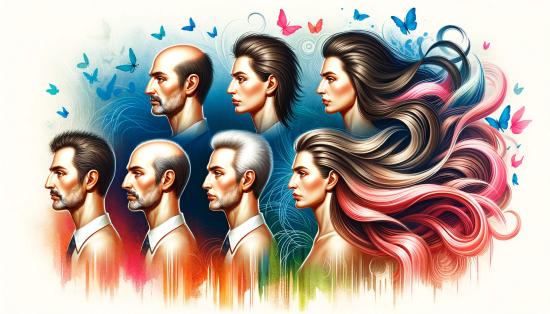
Turning the Tide on Thinning Hair: Revolutionary Hair Loss Solutions
Explore the latest innovative treatments for hair loss. From cutting-edge technology to natural remedies, learn how to reclaim your luscious locks!
Losing hair can be a devastating experience that takes a toll on one's emotional wellbeing. Whether it's due to genetics, stress, or other factors, the impact of hair loss goes far beyond the physical changes. It can lead to feelings of insecurity, low self-esteem, and even depression. It's important to understand the emotional impact of hair loss in order to address it effectively and find the right treatment approach that not only promotes hair regrowth but also restores confidence and self-esteem. In this blog post, we will delve into the emotional impact of hair loss and explore various treatment options, from traditional methods to emerging technologies and natural remedies, to help you regain control over your hair and your emotional wellbeing.
Traditional hair loss treatments have been the go-to solutions for individuals experiencing thinning or balding. These treatments often include topical solutions, such as minoxidil, which is applied directly to the scalp to stimulate hair growth. Another common traditional treatment is finasteride, an oral medication that is known to prevent the further loss of hair. Additionally, some individuals opt for low-level laser therapy, which uses red light to promote hair growth. These traditional treatments have been widely used for many years and have shown varying degrees of success in addressing hair loss.
Hair growth and loss are the result of a complex interplay of biological processes. Hair follicles undergo a cycle of growth, cessation, and shedding, with each strand of hair going through its own cycle. The main stages of the hair growth cycle are the anagen (growth), catagen (transitional), and telogen (resting) phases. Hair loss occurs when the hair follicles enter the telogen phase prematurely, leading to excessive shedding and thinning of the hair. This can be caused by a variety of factors, including genetics, hormones, and environmental stressors. Understanding the science behind hair growth and loss is essential for developing effective treatments that target the root cause of the issue.
Emerging technologies in hair regeneration are offering new hope to those struggling with hair loss. One such technology, known as platelet-rich plasma (PRP) therapy, involves drawing a small amount of the patient's own blood, processing it to isolate the platelet-rich plasma, and then injecting it into the scalp. This concentrated plasma contains growth factors that can stimulate hair follicles, promoting new hair growth. Another cutting-edge treatment is low-level laser therapy (LLLT), which uses red light to enhance cellular activity in the scalp, leading to increased hair growth. Additionally, stem cell therapy has shown promise in regenerating hair follicles and reversing hair thinning. These innovative approaches are revolutionizing the field of hair restoration and providing renewed confidence to individuals experiencing hair loss.
Natural remedies have been used for centuries to address various health concerns, including hair loss. While some people may be skeptical of their effectiveness, there is growing evidence to suggest that certain natural remedies can promote hair growth and improve the overall health of the scalp. For example, essential oils like peppermint, rosemary, and lavender have been shown to have stimulating effects on hair follicles and may help to reduce hair shedding. Additionally, herbs such as saw palmetto and ginseng are believed to inhibit the activity of DHT, a hormone associated with hair loss. While more research is needed to fully understand the mechanisms behind these natural remedies, many people have reported positive results from incorporating them into their hair care routine.
Incorporating certain dietary changes can play a significant role in preventing hair loss and promoting hair growth. Consuming a diet rich in essential nutrients such as protein, iron, and vitamins A and C can support the health of your hair and scalp. Foods like lean meats, fish, leafy greens, and citrus fruits are excellent sources of these nutrients. Additionally, including biotin-rich foods like eggs, nuts, and seeds can help strengthen the hair shaft and improve overall hair health. Omega-3 fatty acids, found in fatty fish and flaxseeds, have anti-inflammatory properties that can benefit the scalp and hair follicles. Avoiding excessive consumption of processed foods and sugary snacks is also crucial, as they can contribute to inflammation and hormonal imbalances that may impact hair health. Overall, a balanced and nutrient-dense diet is essential for maintaining healthy hair and preventing hair loss.
When it comes to combating hair loss, surgical options are available for those seeking more permanent solutions. Hair transplant procedures, such as follicular unit transplantation (FUT) and follicular unit extraction (FUE), involve taking hair follicles from a donor area and implanting them into the thinning or balding areas. These procedures can yield natural-looking results and are considered safe and effective for suitable candidates. Another surgical option is scalp reduction, which involves removing bald scalp and stretching hair-bearing scalp closer together. While surgical options for hair loss treatment can be more invasive and costly than non-surgical alternatives, they can provide long-lasting results for individuals struggling with significant hair loss.
When it comes to making treatment choices for hair loss, it's important to consider all the available options and weigh their potential benefits and drawbacks. From traditional treatments like minoxidil and finasteride to emerging technologies such as PRP therapy and LLLT, there is no one-size-fits-all solution. Consulting with a qualified dermatologist or trichologist can help you determine the most suitable treatment approach based on the underlying cause of your hair loss, your overall health, and your personal preferences. In some cases, a combination of treatments may be recommended to achieve optimal results. As you navigate the multitude of choices, it's also essential to keep in mind that hair loss can have a significant emotional impact. Seeking support from peers or professional counseling can complement your treatment plan and provide invaluable emotional support. Remember, regaining confidence in your appearance and reclaiming your luscious locks is a journey, and being patient and persistent in your treatment choices is key to achieving the desired results.
Related posts


